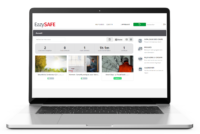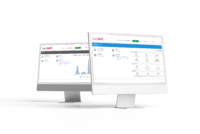Toolbox Talks 101

GEMMA COLLINS DOYLE
EHS Consultant
EazySAFE
With construction sites beginning to open slowly over the next few weeks, the concept of Toolbox Talks is more important than ever. Working alongside COVID-19 means that new rules about social distancing and guiding your staff on how to work safely is critical. Toolbox talks will help you get the new information across in a safe and easy way and can compliment existing online inductions or classroom training. Of course, the Toolbox Talks themselves will have to managed correctly too, physical distancing is needed and it may require you carrying out more than one session to ensure you comply with the rules and keep your workers safe.
What are Toolbox Talks?
A Toolbox Talk is an informal safety meeting that zones in on safety topics related to the job, such as workplace hazards and safe work procedures. The talks are usually short in duration and usually take place on the work site before work commences or at the beginning of a new shift. It can be a highly effective way to refresh employee’s knowledge and know how and to cover last minute safety checks.
Who should host a Toolbox Talk?
The talk can be led by a few different people. They are usually led by the foreman or supervisor. However, anyone can lead the talk, it could be the owner of the company, the Health and Safety Officer or even a guest speaker! Toolbox Talks form part of the safety culture on your site and help promote staff engagement.
Who should have Toolbox Talks?
The idea originated within the construction industry, so it is commonplace for sites etc. to have these. However, Toolbox Talks could work in any industry! Any company that values the health, safety and wellbeing of their employees and contractors, should consider having these talks, you could however change the name to something like, Safety Moments or Safety Briefing.
What kind of topics should be covered?
Once the topic is related to health and safety or wellbeing, its totally up to you, what you cover. The most important thing is it that it is relatable to the employees and covers potential hazards in the workplace. Here are some examples:
- A construction crew may have a talk on how to use power tools safely or how to protect their skin in hot weather. Other topics more relatable to the times we are living in, could be how to social distance in the workplace, hand/cough/sneeze hygiene.
- A warehouse could have briefing on slips/trips/falls in the workplace or manual handling or how to recognise worker fatigue.
- Office workers could have a safety chat on how to sit and work correctly at your desk, workplace stress or good housekeeping.
How long should a Toolbox Talk last?
Typically, a talk should be short enough to keep employee’s attention, but long enough to get the important message across. Remember, the talks are in addition to your safety program and not meat to replace certified training or procedures. Try to keep the duration to between five and twenty minutes.
What should the frequency of the talks be?
Again, this entirely up to you. You can never have enough Toolbox talks or educate enough about Health and Safety! Depending on the type of work and the hazards, it may be necessary to have a daily Toolbox Talk, or maybe a weekly one will suffice. In an office area or a low risk area, a monthly briefing may be adequate.
Attendance
It is important for employees to attend the talks and it should be recorded that they were present. In usual circumstances, employees would be required to sign in on an attendance sheet, but with the times we are living in, passing this around could heighten the risk of also passing around COVID-19! Try a roll call instead and get one person to take note or use online registers. Make sure the topic, date, time, name and location are recorded. If using hard copy, keep the paper copy and also scan it, so you have it in both formats. Toolbox Talks are an excellent way to get together as a team and discuss and thrash out important safety topics. These meetings will refresh minds for any workplace issue and will ensure everyone gets a chance to ask questions. If run correctly, they will refresh, motivate and prepare your team. Having these meeting before work starts, you are planting a seed of discussion among employees, the topic will be top of mind, decreasing the likelihood of accidents, near misses and incidents. Instead employees will go into a job with a heightened awareness. Having regular Toolbox Talks will help build a positive safety culture, because when you discuss safety regularly, employees will start to live by the safety culture that your company is creating.

Discover our Safety Training Platform
Train your employees anytime, anywhere with our environmental, health, safety and wellness training platform.

TAILORED TRAINING
Discover our safety training courses and ehs onboardings, which can be customised and offered in several languages.

SAFETY MANAGEMENT
Ensure the distribution of your safety policy by training your permanent, temporary or seasonal staff.

GLOBAL MONITORING
Simplify the management of your safety policy thanks to the numerous dashboards and training reports.
